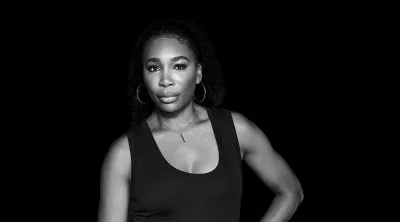Venus Williams campaign emboldens women to speak up for health care

“Do you hear me?”
Tennis star Venus Williams looks straight at the camera, her question echoing like an inner voice.
“Would you hear me if I won another title?”
Then, other women take up the refrain: “If I had more diplomas? If I dressed a different way? If I wasn’t Black? If I wasn’t a woman?”
The striking black and white video is part of a new Blue Shield of California campaign. The goal is to embolden women to advocate for themselves in health care settings. It's also designed to raise awareness among health care providers that women sometimes don’t feel heard. It launches at a time when more stories about the health care experiences of Black women, in particular, are emerging, stories about complicated childbirths ending in tragedy because someone dismissed a mother’s concerns or about the barriers to finding culturally appropriate mental health care.
Fans can relate to Williams’ experiences and values
Blue Shield of California’s Suzanne Buffington says Williams is a natural choice for a campaign that could make a real difference for women. “Williams has shared so much about her own health care journey,” including how long it took to get certain diagnoses because she didn’t feel heard. “Plus, she’s a beloved celebrity,” says Buffington, “and people will feel a connection to her and her values.”
One of those values is increasing access to mental health care. In September 2021, Williams announced a donation of $2 million dollars, in partnership with BetterHelp, an online therapy platform, and the Women’s Tennis Association, to provide a month of free therapy to tennis fans. In a statement on the WTA website, the seven-time Grand Slam winner said it was more important now than ever to address the stigma around seeking professional mental health help.
A year-long collaboration to inspire women to advocate for themselves
Venus Williams will collaborate with Blue Shield of California over the next year, speaking out on a variety of issues. Those include her auto-immune disorder Sjogren’s Syndrome, mental health, Black maternal health, and fitness and wellness. The tennis champion told Blue Shield she was inspired to speak up and make her story heard because too many women have felt dismissed or ignored when seeking answers about their health.
Health care providers are part of the solution
Buffington makes it clear the campaign is not about demonizing health care providers. They’re often part of the solution. “Together we can make a difference,” she says. “We need to have providers, communities and payers, like ourselves, working together to improve health equity, to make sure women’s voices are heard throughout the system.”
Blue Shield of California is an independent licensee of the Blue Cross Blue Shield Association, an association of independent, locally operated Blue Cross and Blue Shield companies.
